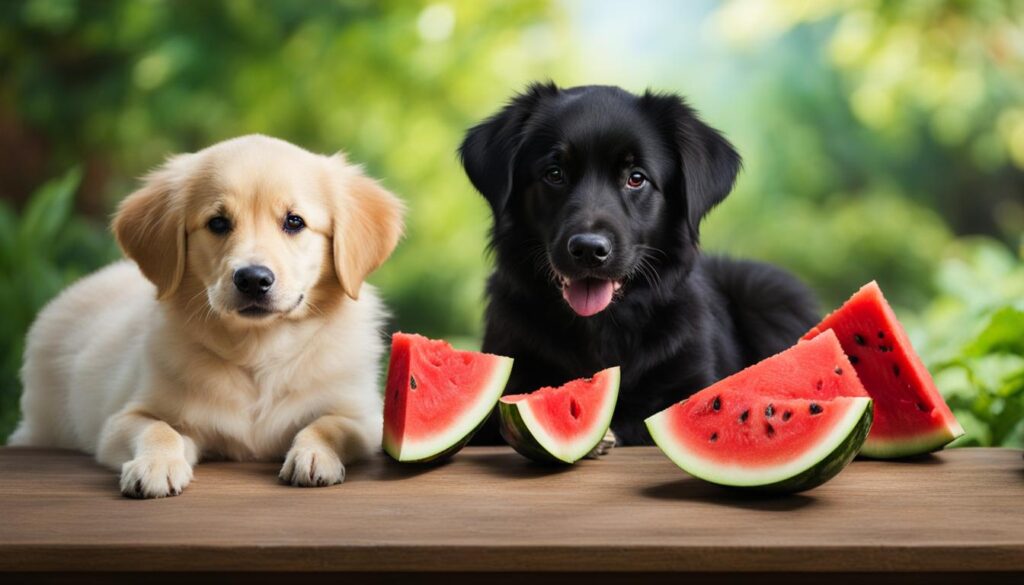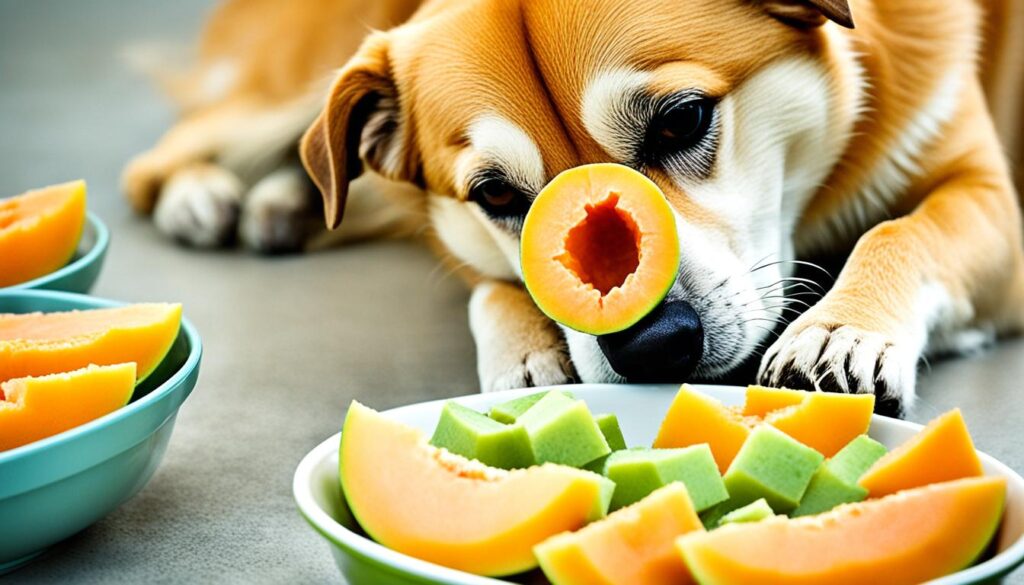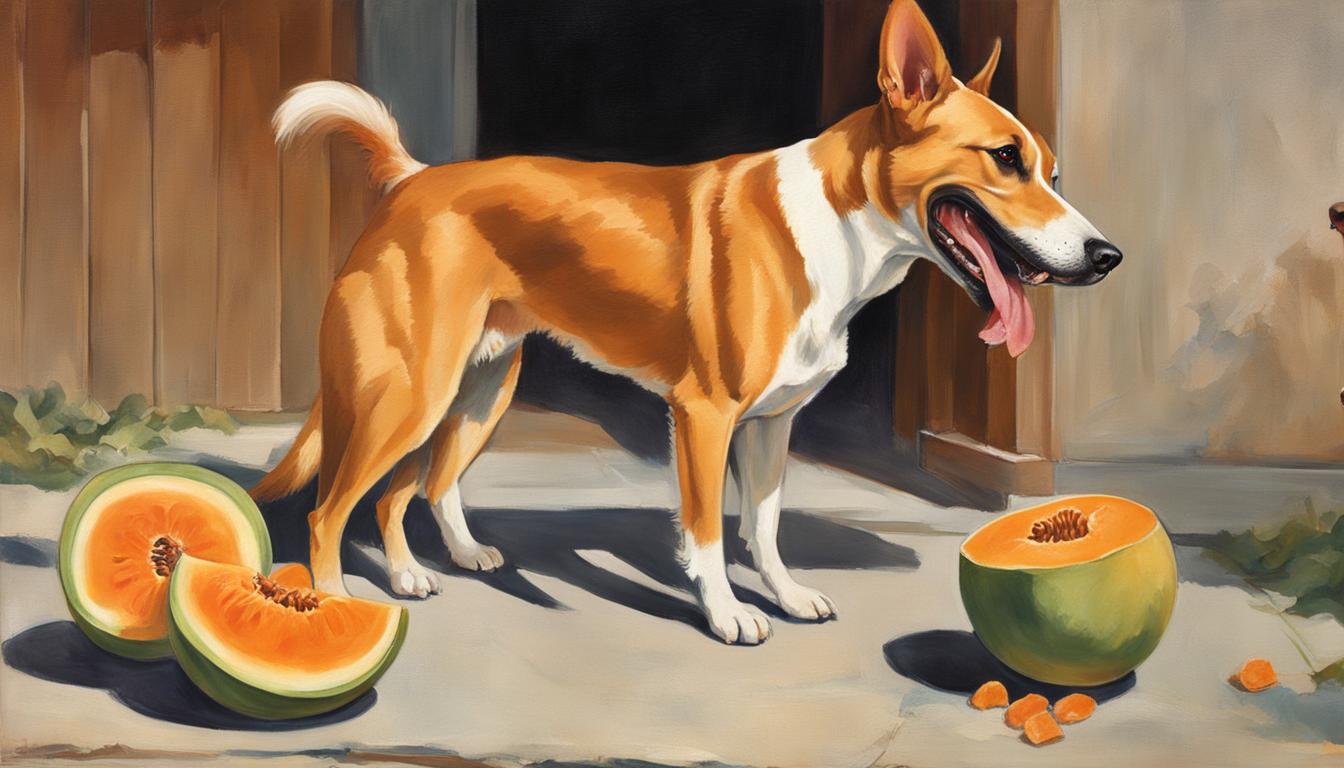As an Amazon Associate I earn from qualifying purchases.
Picture this: it’s a hot summer day, and you’re indulging in a refreshing slice of juicy cantaloupe. The sweet aroma fills the air, and the vibrant colors brighten your mood. But as you savor every delicious bite, a curious pair of eyes stare at you, begging for a taste. It’s your loyal canine companion, wagging their tail in anticipation, hoping to share in the tasty delight.
You pause for a moment, wondering if it’s safe to share your cantaloupe with your furry friend. Can dogs have cantaloupe? And if they can, is it a healthy choice for them? Well, wonder no more, because we’re here to provide all the answers you need!
Key Takeaways:
- Cantaloupe is safe for dogs to eat in moderation.
- It is a healthy alternative to traditional treats, especially for overweight dogs.
- Cantaloupe is rich in dietary fiber, vitamins B6, A, and C, niacin, folate, and potassium.
- It promotes healthy digestion, prevents constipation and dehydration, and provides antioxidants that can reduce the risk of certain diseases.
- However, it should be fed in moderation to avoid gastrointestinal upset and canine obesity. Consult a veterinarian if you have concerns about feeding cantaloupe to your dog.
Is Cantaloupe Good for Dogs?
If you’re wondering whether cantaloupe is a healthy option for your furry friend, the answer is a resounding yes! Cantaloupe is not only delicious but also packed with essential nutrients that can benefit your dog’s overall well-being.
So, why is cantaloupe a great choice for your canine companion? Let’s break it down:
1. Rich in Vitamins and Minerals
Cantaloupe is packed with important vitamins, including B6, A, and C. These vitamins act as antioxidants in dogs, supporting healthy cell function and reducing the risk of certain diseases. Additionally, cantaloupe is a good source of niacin, folate, and potassium, which are vital for your dog’s overall health.
2. Low in Calories, High in Hydration
Integrating cantaloupe into your dog’s diet can provide a healthy and hydrating snack option. With its high water content and low caloric value, cantaloupe can help keep your pup hydrated and maintain a healthy weight.
3. Promotes Digestive Health
The dietary fiber found in cantaloupe aids in digestion and can help prevent constipation and dehydration in dogs. By adding cantaloupe to your dog’s diet as a treat or occasional snack, you can support a healthy digestive system.
Remember, moderation is key when introducing any new food to your dog. While cantaloupe is generally safe, it’s important to offer it in appropriate portion sizes to prevent any potential gastrointestinal upsets.
“Cantaloupe is a nutritious and hydrating snack that provides essential vitamins and minerals for your dog’s overall well-being. Including it in their diet can promote digestion and support a healthy weight.”
As always, consult with your veterinarian before making any dietary changes for your dog, especially if they have specific health conditions or dietary restrictions. They can provide personalized recommendations based on your dog’s needs.
With the right portions and precautions, cantaloupe can be a delicious and healthy addition to your dog’s diet. So go ahead and treat your furry friend to a refreshing slice of canine-approved cantaloupe!
The Dangers of Eating Cantaloupe
While cantaloupe is generally safe for dogs, it’s important to be aware of the potential dangers associated with feeding it to them. Here are a few risks to consider:
- Cantaloupe rinds can cause gastrointestinal upset and may become impacted in a dog’s digestive tract.
- The rinds and seeds of cantaloupe can pose a choking hazard, especially for smaller dogs.
- Feeding cantaloupe should be done in moderation to prevent canine obesity, as it contains natural sugars that can contribute to weight gain.
- Cantaloupe may not be suitable for diabetic dogs due to its high sugar content, which can cause spikes in blood sugar levels.
To ensure your dog’s safety, it is crucial to remove the seeds and rind before feeding them cantaloupe. This will minimize the risk of choking and gastrointestinal issues.
In comparison, let’s take a look at the benefits and risks of feeding watermelon to dogs in the next section.
Expert Insight:
“Cantaloupe can be a refreshing and nutritious treat for dogs, but it’s important for pet owners to be cautious. While the fruit itself is generally safe, the rinds and seeds can pose a choking hazard and cause digestive problems. Always remove the rind and seeds before feeding cantaloupe to your furry friend.”
– Dr. Samantha Johnson, Canine Nutrition Specialist
Can Dogs Eat Watermelon?
Watermelon is not only a refreshing summer treat for humans, but it can also be a safe and delightful snack for your furry friend! Dogs eating watermelon is generally safe, as long as it is given in moderation. Plus, it’s a great source of hydration to keep your pup cool on hot days.
Like cantaloupe, it’s crucial to remove the seeds and rind before offering your dog a juicy slice of watermelon. The seeds can pose a choking hazard, and the tough rind may cause digestive issues. Your dog will enjoy the sweet, juicy flesh of the watermelon while benefiting from the essential nutrients it contains, such as vitamin A and vitamin C.
If you’re uncertain whether watermelon is the right choice for your dog, consulting with a veterinarian is always a good idea. They can provide personalized advice based on your dog’s specific dietary needs.

Just look at how much joy a simple watermelon slice can bring to a dog’s day!
How to Safely Feed Your Dog Cantaloupe
To safely feed cantaloupe to your dog, it is important to follow a few precautions. While cantaloupe is generally safe for dogs, it is crucial to remove the seeds and rind before offering it to your furry friend. The seeds can be a choking hazard, and the rind may cause gastrointestinal upset or blockages.
Cut the flesh of the cantaloupe into small, bite-sized pieces that are easy for your dog to chew and swallow. This ensures that your dog can enjoy the delicious taste and nutritional benefits of cantaloupe without any potential hazards.
Start by offering a small amount of cantaloupe to your dog, especially if it is their first time trying this fruit. Monitor their reaction closely for any unusual signs or symptoms. It’s always better to introduce new foods gradually to observe any potential allergic reactions or digestive issues.

If you notice any negative reactions such as vomiting, diarrhea, or changes in behavior, consult a veterinarian immediately. Every dog is different, and what may be safe for one dog may not be suitable for another.
Remember, moderation is key. While cantaloupe can be a safe and healthy treat for your dog, it should not replace their regular balanced diet. Treats should only make up a small portion of your dog’s overall calorie intake to prevent obesity and other health issues.
Incorporating cantaloupe into your dog’s diet can be a fun and healthy way to provide them with a safe fruit snack. Just be sure to take the necessary precautions and monitor their response closely.
Creative Ways to Serve Cantaloupe to Your Dog
Besides feeding plain cantaloupe chunks, there are creative ways to incorporate cantaloupe into your dog’s diet. You can mash up cantaloupe and mix it into their regular dog food as a food topper. Another option is to stuff mashed cantaloupe into a KONG toy and freeze it for a refreshing treat. You can also blend cantaloupe with other dog-safe fruits to make a smoothie or mix it with plain, sugar-free yogurt for a cantaloupe yogurt treat. Additionally, you can make cantaloupe popsicles or dehydrate small pieces of cantaloupe for a chewy snack.
These fun and tasty options not only add variety to your dog’s diet but also provide them with healthy snacks and a refreshing way to enjoy cantaloupe. Remember to remove the seeds and rind before incorporating cantaloupe into these recipes or treats to prevent any choking hazards or digestive issues.
Conclusion
So, can dogs indulge in the sweet goodness of cantaloupe? Absolutely! Cantaloupe can be a safe and healthy addition to your furry friend’s diet. Packed with essential nutrients and hydration, it offers a refreshing and nutritious snack option. But remember, as with any treat, moderation is key.
To ensure your dog’s safety, make sure to remove the seeds and rind before serving. These pesky seeds can be a choking hazard, and the rind may cause digestive issues. You want your pup to have a delightful experience with cantaloupe, not a tummy ache!
It’s worth mentioning that while cantaloupe is a great snack choice overall, dogs who are overweight or diabetic should enjoy it sparingly. The natural sugars in cantaloupe may not be suitable for their specific dietary needs. If you have any concerns or questions, it’s always wise to consult with your veterinarian, who can provide tailored advice based on your dog’s individual needs.
So go ahead, treat your furry companion to a delicious cantaloupe snack! Just keep in mind the importance of portion control, removing seeds and rind, and seeking professional guidance when needed. With these precautions in place, your dog can reap the benefits of canine nutrition and enjoy the fruity goodness of safely indulging in cantaloupe.
FAQ
Can dogs have cantaloupe?
Is cantaloupe good for dogs?
What are the dangers of eating cantaloupe for dogs?
Can dogs eat watermelon?
How can I safely feed my dog cantaloupe?
What are some creative ways to serve cantaloupe to dogs?
Can dogs have other fruits besides cantaloupe?
Source Links
- https://www.petmd.com/dog/nutrition/can-dogs-eat-cantaloupe
- https://www.akc.org/expert-advice/nutrition/can-dogs-eat-cantaloupe/
- https://www.purina.co.uk/articles/dogs/feeding/what-dogs-eat/can-dogs-eat-melon
As an Amazon Associate I earn from qualifying purchases.

